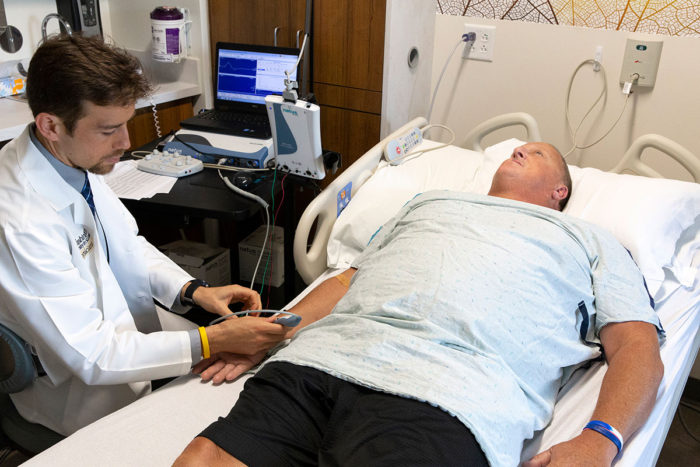New ALS therapy in clinical trials
Drug extends survival, reverses some neuromuscular damage in animals
 Mike Worful
Mike WorfulRobert Bucelli, MD, PhD, measures Gregory Easter's neuromuscular function. Easter, who has an inherited form of amytrophic lateral sclerosis, a fatal neuromuscular disease, is taking part in a clinical trial to evaluate an experimental drug. New research at Washington University School of Medicine in St. Louis shows the drug extends survival and reverses some neuromuscular damage in mice and rats and may help people whose disease is caused by mutations in the gene SOD1.
About 20,000 people in the United States are living with amyotrophic lateral sclerosis (ALS), also known as Lou Gehrig’s disease. The invariably fatal disease kills the nerve cells that control walking, eating and breathing. Few people survive more than three years after diagnosis.
Now, new research led by Washington University School of Medicine in St. Louis indicates an investigational therapy for an inherited form of ALS extends survival and reverses signs of neuromuscular damage in mice and rats. The findings, published July 16 in The Journal of Clinical Investigation, have led to a phase one/two clinical trial to investigate whether the drug could benefit people with ALS whose disease is caused by mutations in a gene called SOD1.
“This drug had an impressive effect in mice and rats with just one or two doses,” said Timothy Miller, MD, PhD, the David Clayson Professor of Neurology at Washington University. “We don’t know yet if this works in people, but we’re very hopeful. We’ve completed the first phase of safety testing, and now we’re working on finding the right dose.”
About 10 percent of ALS cases are inherited. Of those, about a fifth are caused by mutations in SOD1. Such mutations cause the SOD1 protein to be overly active, which suggests that reducing protein levels might help ALS patients with SOD1 mutations.
Patients with ALS have few options for treatment. Only two drugs have been approved by the Food and Drug Administration (FDA) for ALS, and both only modestly slow the course of the disease.
In collaboration with Ionis Pharmaceuticals, Miller and colleagues tested DNA-based compounds that block the body from making SOD1 protein.
Miller and colleagues at Ionis tested two such compounds – known as antisense oligonucleotides, or oligos for short – in mice and rats. The animals were genetically modified to carry a mutated form of the human SOD1 gene. By a few months old, such animals start having trouble walking and feeding themselves.
Mice were given an anti-SOD1 oligo or a placebo at day 50, and a second dose about six weeks later. The mice that received the active drug maintained their weight 26 days longer and lived 37 days longer than those given the placebo, an increase in life span of 22 percent.
As a comparison, the researchers also tested the treatment in rats. The rats that received an active oligo fared much better than the ones that received the placebo. They maintained their weight more than nine weeks longer and survived eight to nine weeks longer.
The oligos also reversed signs of neuromuscular damage in the animals. By nine weeks old, mice that carry the mutant SOD1 gene are already showing molecular signs of deteriorating neuromuscular function. To find out whether the drug could reverse this decline, researchers treated 9-week-old mice with an anti-SOD1 oligo or a placebo. Muscle function steadily improved over the next eight weeks in the mice that received the active drug, while it continued to decline in the placebo group. A sign of neurological damage rose in both groups, but it rose more than twice as quickly in the mice that received the placebo than the ones given the active oligo.
Miller’s colleague at the School of Medicine, Robert Bucelli, MD, PhD, an associate professor of neurology, leads a phase one/two clinical trial based on Miller’s research. The trial is designed to evaluate the safety of using the oligos in people. Initial safety testing did not identify any obvious hazards. Now, they are testing different doses and regimens to find the most effective way to reduce SOD1 levels without causing unacceptable side effects.
“The phase one/two trial is really still a safety trial,” Miller said. “There are not enough patients in it to really be able to accurately see an effect on disease. But we’re on the cusp of testing the hypothesis that people with ALS caused by mutations in SOD1 can benefit from this treatment. We predict the effect will be good, but we can’t know until we test it.”
More information about the trial (number NCT02623699) can be found at clinicaltrials.gov.







